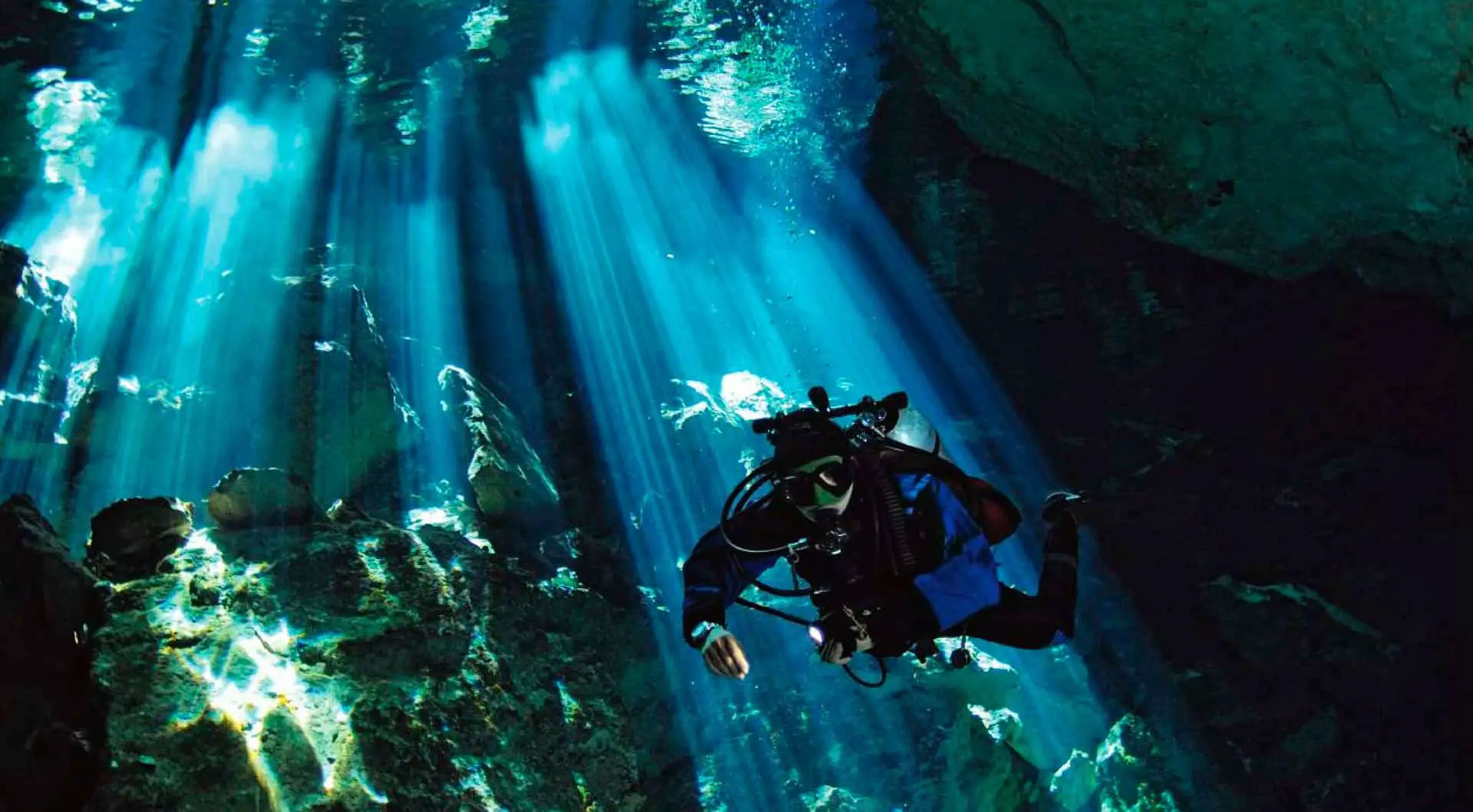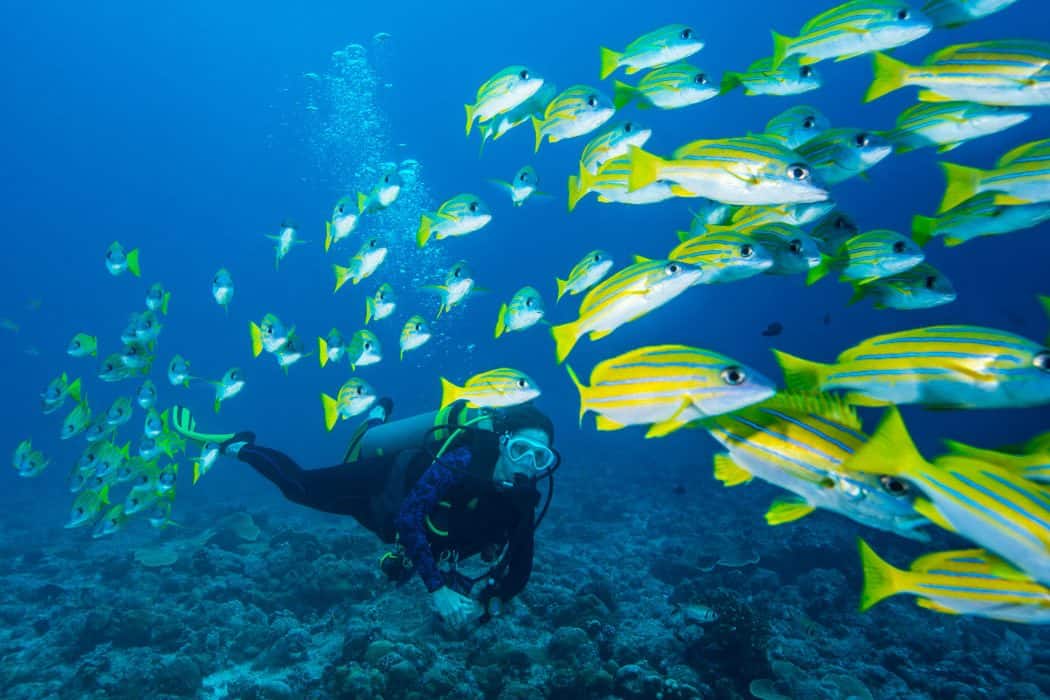*This post may contain affiliate links. As an Amazon Associate we earn from qualifying purchases.
There’s something alluring about the depths of the ocean. For many, the depths of the sea represent mystery, frontier, and discovery. These qualities are what draw every deep sea diver to the water. Because, simply, there is nothing more satisfying than the feeling of exploring the unknown.
Many deep sea divers start out because they want something new from their diving experience. Hookah diving and shallow water diving is fun and all, but the novelty can wear off quickly. With deep sea diving, there is a lot more to discover. However, by this point, most veteran divers refuse to undergo continual training that can protect them in times of danger.
Whenever we gear up for a deep dive, we take on risks and responsibilities beyond that of regular scuba diving. While deep sea diving is a thrilling and awe-inspiring experience, it is also highly dangerous if done improperly. To help minimize those dangers, our experts put together a list of the top 10 things every deep sea diver absolutely must know.
1. Busting the Bends
Every diver needs to protect themselves against the risk of decompression sickness. Simply put, there is no diver in the world that is immune from the hazards presented by “the bends,” otherwise known as decompression illness. This condition is caused by rapid changes in air pressure during a diver’s descent and ascent in the water.
If ignored, the threat of decompression sickness can cause tragedy to strike. In the worst cases, it can induce a loss of consciousness and even death. To prevent this, there are concrete steps that every diver must take being descending to the deep.
For one, always carry a dive computer on your person. This way, you will have a device that will read the pressure in the environment and tell you precisely when to stop to decompress during your ascent. Also, remember to fully hydrate before embarking on a deep sea dive as this helps offset the effects of decompression in your body’s tissues.

2. Know Your (Depth) Limits
We are asked nearly every day: “How deep can you dive while still staying safe?” It is critically important that divers understand how deep they can dive before they run into trouble. Most diving schools will teach you that you should never descend further than 130 feet. And while this is true, even this number is beyond what many experienced divers are capable of.
The answer to “how deep can you scuba dive” ultimately depends on many individual factors that are unique to the diver. For example, it depends on the method of diving being practiced, the equipment being used, and the level of nitrogen their body can safely absorb. However, as a rule, never swim deeper than 130 feet, especially if you are not wearing saturation equipment.
3. Know Your No-Decompression Limit
The no-decompression limit (NDL) is a time limit that every diver’s body naturally imposes on them. The NDL spells out exactly how much time a diver can spend at a certain depth level without having to decompress. By ignoring your NDL, you have a likely chance of developing decompression sickness. Or, in other words, you might “get bent.”
If you have elapsed your NDL, you need to carefully ascend. At regular intervals, be sure to pause so that your body has time to decompress. Ascending too fast can cause you to lose consciousness.

4. Training is Essential, Even for Veterans
Diving school is not reserved for rookie divers only. In fact, many veteran divers can benefit from enrolling in a continuing education program at your local diving certification center. When it comes to deep sea diving, you can never be too safe. By regularly training in a controlled and supervised environment, you can protect you and your team against hazards.
For deep sea divers, we recommend enrolling in specialty courses dedicated to navigating deep waters. We find that the PADI Deep Diver continuing education program is an excellent choice for divers from intermediate to advanced skill levels. This is because PADI specifically teaches their students about diving safety at depths as low as 130 feet.
5. Commercial Work Isn’t All It’s Cut Out to Be
Many experienced divers dreams of one day being able to work as a commercial diver. While it is true that many skilled divers can enjoy lucrative careers as undersea welders or saturation workers, these jobs are not for everyone.
Usually, divers are sucked into these careers because they notice that the pay is attractive (some can even make several hundreds of thousands of dollars a year). However, the job is extremely isolating on a social level and it can require months away from friends and family. For deep sea diving jobs, you need to live and work in a hyper-confined saturation chamber. Doesn’t sound like fun, does it?
6. Hands Off the Marine Life
One of the first things we learn in diving school is to never physically touch or threaten aquatic life. Even if they are predatory fish, chances are they are far more afraid of you than you are of them. However, every year we encounter hot-headed divers who think they can swat at a fish or abuse aquatic life one way or another.
This is unacceptable. Not only is it unethical to touch the marine life in this way, but you can endanger yourself and the environment. For example, a coral reef is threatened around the world. Even by touching it with your gear can cause its natural state to become disrupted and, in so doing, cause further damage to the entire ecosystem. Don’t be that guy.

7. Don’t Buy into Social Pressure
When we are starting out as divers, we often fall victim to the influence of our peers. And while sometimes this can be a good time, we should never feel pressured to do anything we are uncomfortable with doing. Don’t get us wrong, it is healthy to be encouraged to get out in the water and test your limits, but not when it comes at the cost of your health and safety.
Even highly experienced deep sea divers find themselves in awkward situations where their team wants to do something a little too out of their league. Sometimes, team members even want to veer off plan when under water. Always refuse to play along, as this will only encourage such behavior. Instead, firmly signal that you are sticking to the original dive plan.
8. Check, Check, and Re-Check Your Gear
As we become more experienced with deep sea diving, we get bored by the same old routine. As beginners, we are always eager to check our gear and make sure that everything is in perfect working order. However, many old-timers simply check their equipment once before heading out. And even then, most equipment checks just involve a cursory glance.
This is not okay, as it can endanger yourself and the safety of your team. Instead, always remind yourself to check, check, and re-check your gear. That’s right: three complete gear checks before you start the day’s dive. This way, you will never have to worry about loose valves or forgotten gear when you are busy in the deep.

9. Don’t Be Afraid to Get Creative
Underwater diving is meant to be fun, exciting, and passionate. By doing the same dives over and over, we find that our enthusiasm for the sport can quickly fade. To prevent this from happening, encourage yourself to branch out and experiment with new diving styles or new diving locations.
Bored out exploring the North Florida caves? How about trawling the Caribbean Sea, or maybe California’s Cathedral? There are many wonders out there for you to explore. Likewise, don’t hesitate to switch up your style and try hookah diving or saturation diving if you want something different. As a veteran diver, I even find that snorkeling from time to time can help freshen things up and give me a new perspective.
10. When Things Hit the Fan, Know What to Do
Inarguably, this is the most important rule when it comes to deep sea diving. Unlike regular near-surface diving, a lot can go wrong when you start charting the depths. At 130 feet below, your NDL is short and your risk of decompression sickness skyrockets. If you run into trouble, panicking and making a run for the surface can cost you your life.
Instead of acting out of impulse, familiarize yourself with proper emergency management skills. Even if your dive computer fails, you need to know how to safely ascend at any depth. If your breathing tank fails, you need to know how to conserve energy and oxygen so that you can make it up alive. If all else fails, remember to follow the bubbles and to keep your exhale slow and controlled through the whole ascent.


Be aware of your air monitor